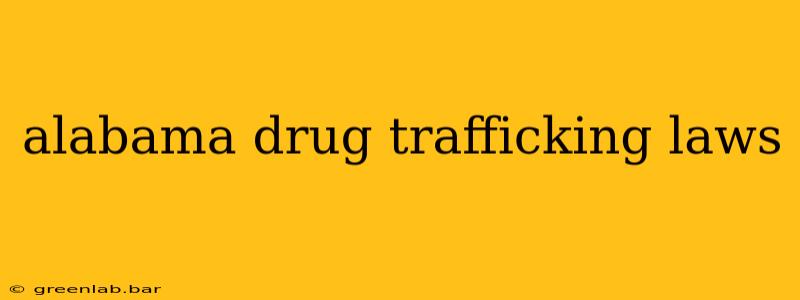Alabama takes a tough stance on drug trafficking, imposing severe penalties on those involved in the distribution and sale of illegal substances. Understanding these laws is crucial for both legal professionals and citizens alike. This guide will delve into the specifics of Alabama's drug trafficking statutes, outlining the key elements, potential penalties, and defenses.
What Constitutes Drug Trafficking in Alabama?
Alabama Code Title 13A, Chapter 8, outlines the specifics of drug trafficking offenses. The core element involves the unlawful distribution or sale of controlled substances. However, the severity of the charge hinges on several factors:
-
Type of Drug: The penalties vary significantly depending on the type of controlled substance involved. For example, trafficking in cocaine carries far harsher penalties than trafficking in marijuana, although the legal landscape regarding marijuana is evolving.
-
Quantity: The amount of the drug possessed is a critical determinant of the charge. Alabama's laws establish specific weight thresholds for each controlled substance, triggering different levels of trafficking charges. Possession of amounts exceeding these thresholds automatically elevates the charge to trafficking.
-
Intent: Prosecutors must prove intent to distribute or sell the drug. This is often established through circumstantial evidence, such as the quantity of drugs possessed, packaging, and the presence of paraphernalia associated with drug distribution.
Penalties for Drug Trafficking in Alabama
Penalties for drug trafficking in Alabama are substantial and can include:
-
Lengthy Prison Sentences: Sentences range from years to life imprisonment, depending on the type and quantity of drugs involved. Mandatory minimum sentences are common, meaning judges have limited discretion in sentencing.
-
Significant Fines: Trafficking convictions often result in substantial fines, potentially reaching hundreds of thousands of dollars.
-
Asset Forfeiture: Alabama allows for the seizure and forfeiture of assets obtained through or used in drug trafficking. This can include vehicles, property, and financial accounts.
-
Additional Penalties: Depending on the specific circumstances, additional penalties may apply, such as probation, community service, and driver's license revocation.
Specific Examples of Penalties (Note: This is not exhaustive and should not be considered legal advice. Always consult with a legal professional for specific information.)
Trafficking in significant quantities of cocaine, methamphetamine, or heroin can lead to decades-long prison sentences and substantial fines. Even trafficking lesser amounts of these substances carries considerable penalties.
Defenses Against Drug Trafficking Charges
While the prosecution bears the burden of proving guilt beyond a reasonable doubt, several defenses may be available to those facing drug trafficking charges in Alabama:
-
Lack of Intent: A strong defense strategy might focus on challenging the prosecution's evidence of intent to distribute. This could involve arguing that the defendant possessed the drugs for personal use.
-
Entrapment: If law enforcement coerced or induced the defendant into committing the crime, an entrapment defense could be viable.
-
Unlawful Search and Seizure: If the drugs were obtained through an illegal search and seizure, the evidence may be inadmissible in court.
-
Chain of Custody Issues: Any break in the chain of custody of the seized drugs could weaken the prosecution's case.
Seeking Legal Counsel
Facing drug trafficking charges in Alabama requires immediate consultation with an experienced criminal defense attorney. The penalties are severe, and navigating the complexities of Alabama's legal system demands skilled representation. An attorney can help you understand your rights, build a strong defense strategy, and protect your interests throughout the legal process.
Disclaimer: This information is for educational purposes only and should not be considered legal advice. The specifics of Alabama drug trafficking laws are complex and subject to change. Consult with a qualified legal professional for advice tailored to your specific situation.

